How To Make Blogs Seems Less Long

H ow long should a blog post be? It's an important and common question because a lot of new bloggers aren't sure whether it's better to write longer or shorter blog posts.
In this article, we'll talk about the ideal blog post length. Plus, we'll go over blog length best practices so that you can attract more readers to your blog, improve your SEO, boost engagement, and more.
So, what is the perfect blog post length?
Keep reading to find out…
What Is the Ideal Length for a Blog Post?
You've probably heard people saying things like "attention spans are shorter than ever" and that "people only want bite-sized information". But this doesn't mean your blog posts should be short.
Longer is often better when it comes to blog posts.
While attention spans may be going down, the average word count of blog posts is on the rise. According to IsItWP, the average post length has increased around 42% between 2014 and 2018, from 800 words to 1,151 words.
In the infographic "The Internet is a Zoo: The Ideal Length of Everything Online" from Buffer, they find that the ideal blog post length is 1,600 words.
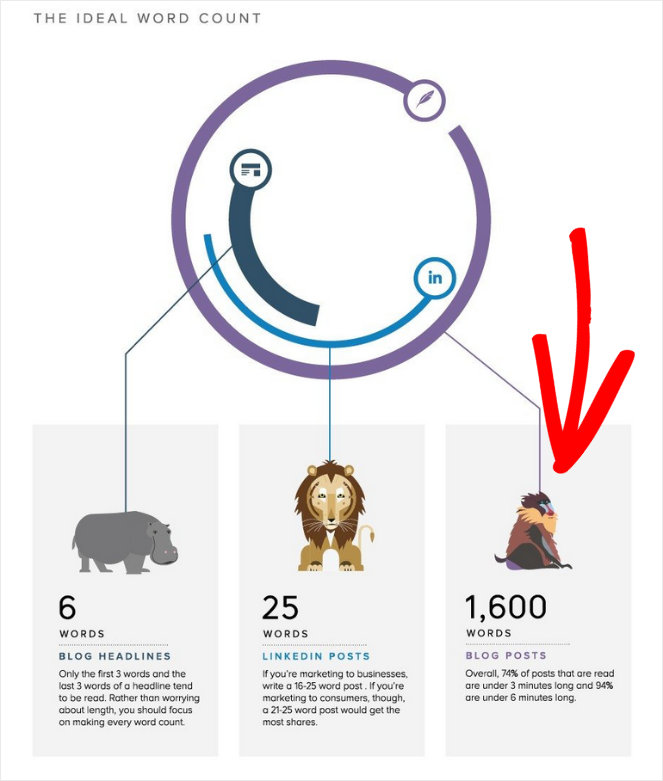
But some sources think a good blog post should be even longer than that.
In a Medium article, the writer says that posts with an average read time of 7 minutes captured the most attention.
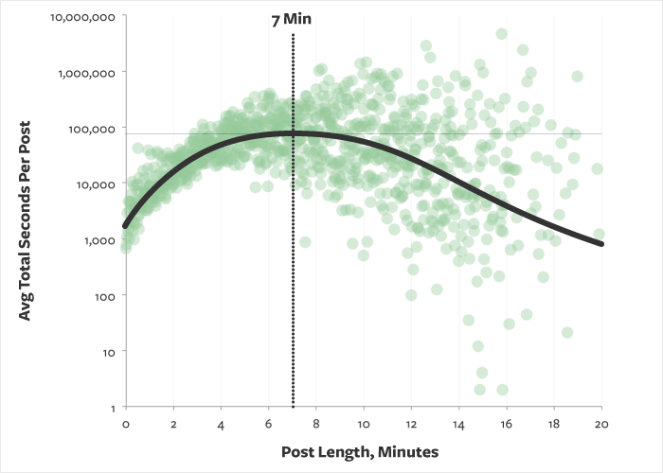
HubSpot took this information and figured out that according to the average reading speed of native English-speaking adults of 300 words per minute, this means that the ideal blog post length is 2,100 words.
Then, HubSpot also took a look at their own blog content and they found that the magic number for a blog post was between 2,250–2,500 words.
As you can see from these different word counts, the ideal blog post length varies depending on who you ask. But, there's one thing they all have in common, they all agree that long-form content is king.
In fact, most bloggers nowadays are writing posts that are longer than 1000 words.
And although long-form blog posts take more time to write than shorter ones, there are big benefits to creating longer content.
Let's take a look at those benefits in the next section.
The Benefits of Long-Form Blog Posts
First, longer blog posts provide more value to your readers and they answer all of their questions in one place. For example, check out our blog post on how to start a blog.
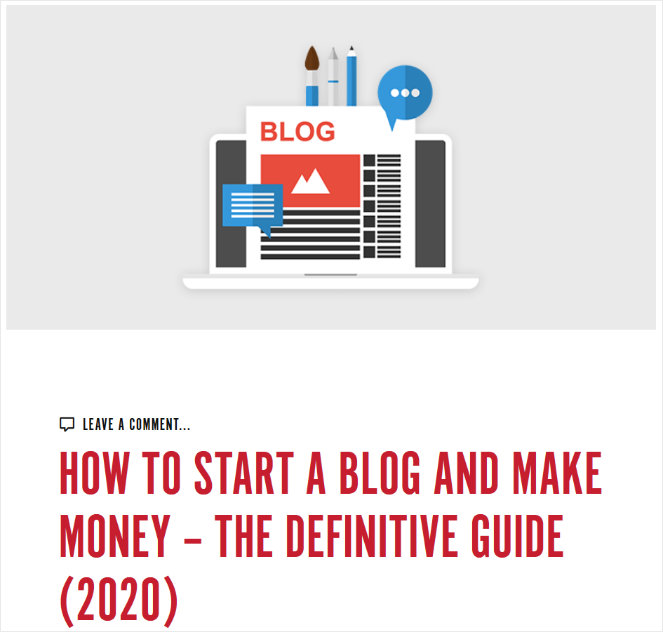
This definitive guide clocks in at around 6527 words! It has everything our readers need to start a blog and make money online.
Now, imagine if it was only 800 words. With such a short post, a lot of valuable information would be missing.
Longer blog posts also help you demonstrate authority in your niche. With long-form content like the blog post above, our readers can trust that we know our stuff when it comes to blogging.
In addition to providing more value to readers and demonstrating your expertise, evidence suggests that longer blog posts perform better in almost every single metric.
Let's take a look at more of the benefits of long-form blog posts…
1. Increases Time Spent on Page
The longer your blog posts are, the longer users will stay on your website. Plus, the longer they stay on your website, the more likely they are to check out more of your awesome content.
In fact, according to findings from Neil Patel, people stayed on the long form content page 40% longer than on the average page, and they looked at 25% more pages than the average visitor.
But all of the visitors to your blog will leave in the end.
Luckily, you can turn your blog visitors into email subscribers with an exit-intent popup from OptinMonster. An exit-intent popup is able to track when a user is about to leave your website and send a message that encourages the user to subscribe to your email newsletter before they go.
Here's an example of an exit-intent popup from the blog Petit Gourmet:

By turning your blog visitors into email subscribers, you can keep them coming back to your site over and over again.
Want more tips to grow your email list? Check out these quick and easy hacks to get more email subscribers.
2. More Shares on Social Media
Studies show that long-form content also gets more shares on social media.
According to QuickSprout, they found that posts that were under 1,500 words, on average received 174.6 tweets and 59.3 Facebook likes. Posts that were over 1,500 words, on average received 293.5 tweets and 72.7 Facebook likes.
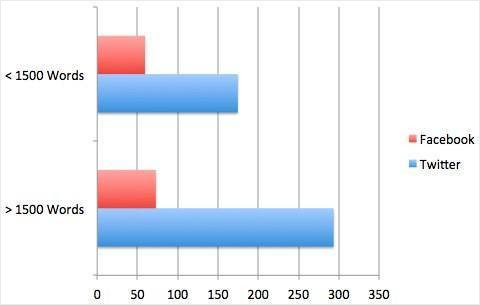
They also discovered that if a blog post is greater than 1,500 words, on average it receives 68.1% more tweets and 22.6% more Facebook likes than a post that is under 1,500 words.
With more shares on social media, you can attract more readers to your blog—your blog posts could even go viral!
Long-form blog posts also help you rank higher in search engine results, which will also help you get your blog posts seen by more users online. So, let's take a closer look at blog post length and SEO.
3. Improves Ranking in Search Engine Results
To attract more readers to your website, you need to optimize your blog posts for SEO. This includes using relevant keywords, adding internal links, creating readable URLs, making sure your website is SEO friendly, and more.
But the word count of your blog posts also plays a role in how well your content ranks on search engines like Google. Longer blog posts rank better.
So, how many words should a blog be for SEO?
A blog post should contain at least 300 words in order to rank well in the search engines. But long posts (1000 words or more) will rank more easily than short posts.
CoSchedule found posts with around 2,500 words typically rank the best.
Capsicum Mediaworks agrees with this. Their research shows that, on average, the top 10 results for most Google searches are between 2,000 and 2,500 words.
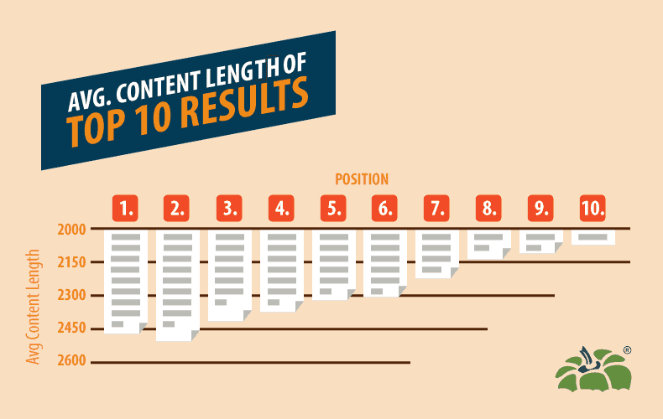
Writing long-form blog posts will boost your SEO ranking so that more users can find your awesome content online!
Check out our SEO guide for bloggers to get more tips on how you can improve your SEO.
Now that you know the benefits of writing long-form blog posts, it's time to start writing!
How to Write a Long-Form Blog Post
If you're used to writing short blog posts, the idea of writing a 1000+ word blog post seems daunting.
You might be wondering, how long does it take to write a 1000 word blog post?
Well, it all depends on your experience and the topic you're writing about.
If you're new to writing and you're unfamiliar with the topic you're writing about, creating a 1000 word blog post could take you 3-4 hours or more. But, if you're an experienced writer and you're an expert on the subject matter, you could crank out a 1000+ word blog post in 1 hour.
To become a faster writer, you can try out tips like:
- Doing all of your research before you start writing
- Creating a detailed outline to guide you
- Removing distractions by turning off phone notifications
- Drafting your blog post in Google Docs instead of writing it directly in WordPress
But remember, it's not all about hitting the word count and writing your article as fast as possible. It's also extremely important to address these other factors:
- Readability
Your blog posts need to be easy-to-read for users. But the longer your blog post, the harder it is to keep your readers engaged, and no one would want to read it. Be sure to improve the readability of your blog posts by keeping your sentences short, using fewer sentences per paragraph, and using easy-to-understand words instead of difficult ones.
- Uniqueness and usefulness
If your blog post has the same information as every other post on the topic, Google has no reason to show it to searchers on the first page. Do your research and make sure your blog post offers something unique.
- Accuracy and authority
Articles that are well-researched and accurate are favored by Google and are more likely to attract links from other blogs. The more backlinks your blog post attracts, the more Google will recognize your site's authority on the topic.
- Promotion method
There is absolutely no point in spending days (or even weeks!) writing a brilliant long-form article if it doesn't get seen by anyone. Learning how to promote a blog post is just as important as knowing how to write one.
If you can find a balance between writing long, useful articles and also knowing how to promote them effectively you can build a successful blog that lasts a long time into the future.
It's Not All About the Word Count
Writing longer blog posts is beneficial to your readers and to the success of your blog. But don't obsess over the actual word count or hitting that magical ideal blog post length.
After all, there's no such thing as a single perfect blog post length for all topics!
Instead, focus on providing valuable long-form content to your target audience.
Now that you know how long a blog post should be, you're ready to start writing! Before you get started, check out our article on how to write a good blog post next.
And be sure to sign up for our email newsletter for more helpful blogging tutorials like this one.
How To Make Blogs Seems Less Long
Source: https://www.blogtyrant.com/long-vs-short-blog-posts/
Posted by: silvasessood.blogspot.com

0 Response to "How To Make Blogs Seems Less Long"
Post a Comment